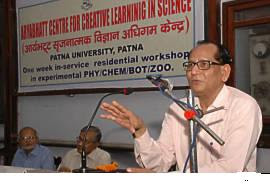Rise of Ambedkarite Movement in Rajasthan

Rajendra Bora
JAIPUR. When BSP, headed by Mayawati, is gaining greater political strength in subsequent elections thanks to reverence by millions of Dalits for Ambedkar Prof. Shyam Lal, former Vice-Chancellor of Rajasthan University, Jaipur and Jai Narain Vyas Universty, Jodhpur has come out with a new study on the movement spearheaded by the maker of Indian Constitution. In the exciting and timely study with painstaking research Prof. Shyam Lal, a noted sociologist who is currently serving as Vice- Chancellor of Patna University in Bihar, has profusely documented the history of what he calls Ambedkarite Movement in Rajasthan.
Since the phenomenon cannot be seen in Rajasthan specific vision only, a general overview of Ambedkar’s efforts in awakening socio-political consciousness among Dalits has also been presented in the study that has been published in Prof. Shyam Lal’s latest book.
Dalit assertion, liberation and emancipation are the themes that have come to centre stage lately. There have been tones of literature, including academic work and analyses, available on the situation of Dalits and their plight. Several social and political analysts have tried to analyse the cause of the pitiable situation in which untouchable castes remained from time immemorial. Several authors and analysits have tried to look at the problem from their respective world view. Marxists see the deplorable situation as a class problem instead of caste problem. Some see the emancipation of Dalits via grabbing political power. There have been reform movements from both within and without untouchable masses.
The book highlights the growth of first the reform movement from within the Dalit communities and then political efforts for their emancipation. He has traced different reform movements from the pre-British period to the British rule and to the present day after the Independence, all culminating into Ambedkarite Movement and rising consciousness for Dalit-Identity.
The book is virtually an ocean of information, collected painstakingly and judiciously by doing much legwork by the author. And it is very timely too.
Prof. Shyamlal has been able to meet, interact and discuss with minor and major players of the Dalit movement and record not only facts but also their views and perceptions about the situation of the communities in different periods. Here the author holds advantageous position as he belongs to the same community with whom he had been talking. Dalits, literate or illiterate, readily opened up before him to express themselves. For any outsider it would have been very difficult to gain confidence of the introvert and meek people whose story one wanted to tell.
Prof. Shyamlal has earned a reputation of being an eminent sociologist and the present work is an ample proof of his scholarly facet. In this book he has not treaded on hearsays or false ideas. Authenticity of his documentation and narration is the hallmark of the book. As a true social scientist he explores the reasons for the limitation of the Ambedkar movement too.
His scholarly work is in fact a ground work for others to research the subject further.
(The review appeared in Jaipur Live supplement of Hindustan Times on March 18,2009)


Comments